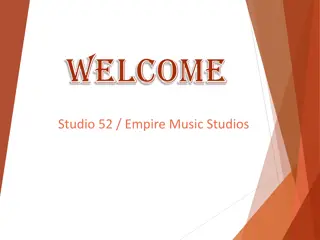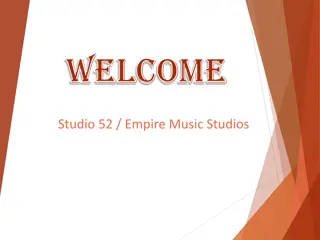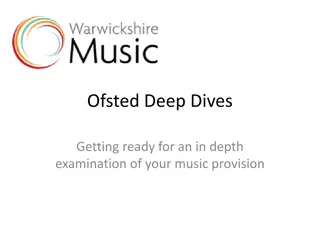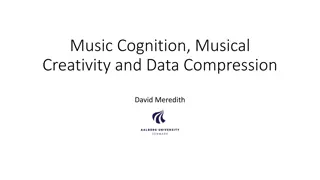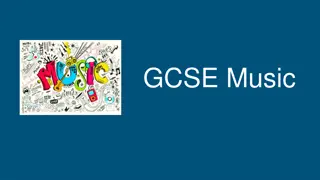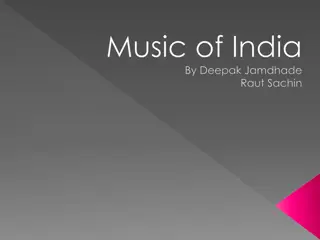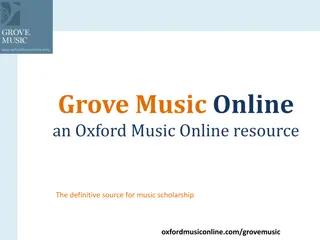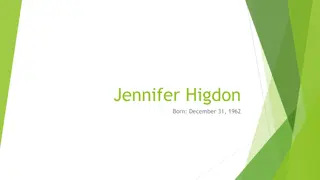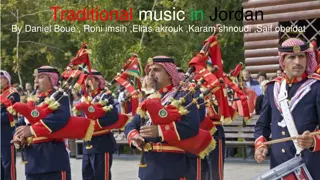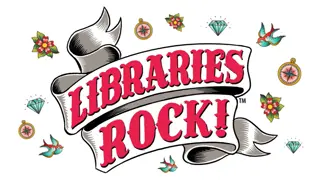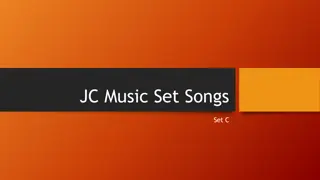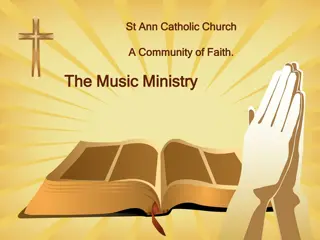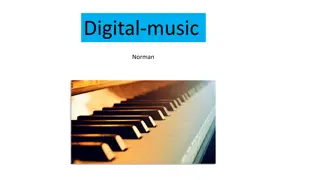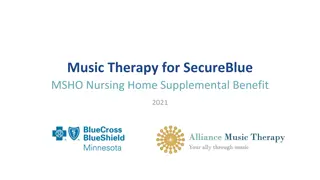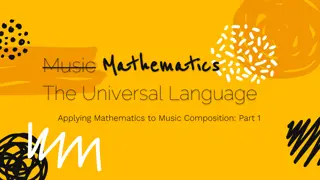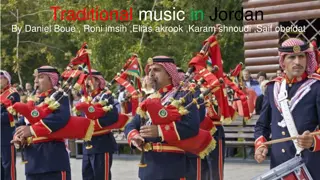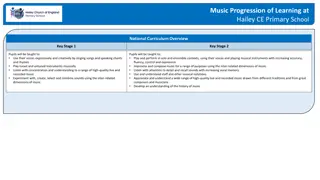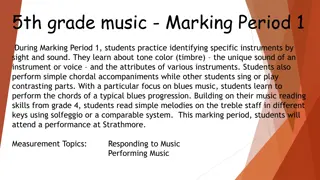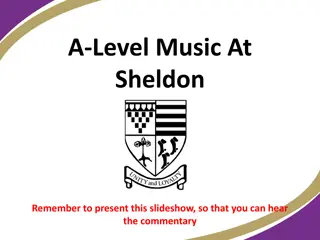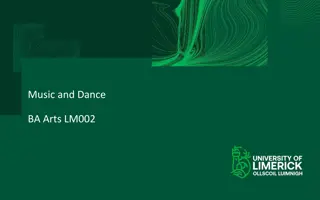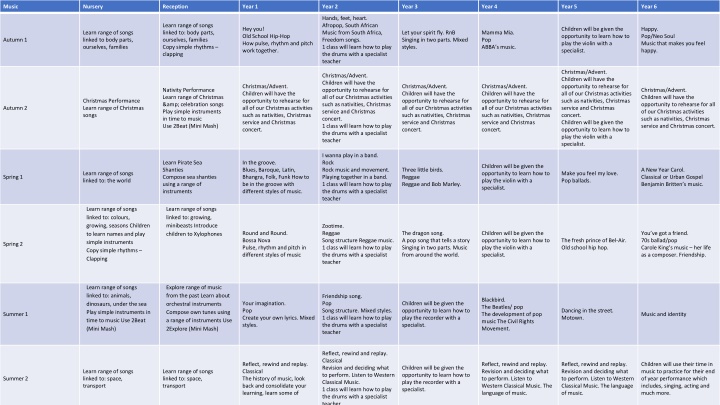
Diverse Music Curriculum for Children: From Afropop to Classical Exploration
Explore a diverse music curriculum for Nursery to Year 6, covering genres like Afropop, South African music, Old School Hip-Hop, Pop, Reggae, and more. Children will learn to play instruments, sing, compose, and perform, fostering a love for music from a young age.
Download Presentation

Please find below an Image/Link to download the presentation.
The content on the website is provided AS IS for your information and personal use only. It may not be sold, licensed, or shared on other websites without obtaining consent from the author. If you encounter any issues during the download, it is possible that the publisher has removed the file from their server.
You are allowed to download the files provided on this website for personal or commercial use, subject to the condition that they are used lawfully. All files are the property of their respective owners.
The content on the website is provided AS IS for your information and personal use only. It may not be sold, licensed, or shared on other websites without obtaining consent from the author.
E N D
Presentation Transcript
Music Nursery Reception Year 1 Year 2 Year 3 Year 4 Year 5 Year 6 Hands, feet, heart. Afropop, South African Music from South Africa, Freedom songs. 1 class will learn how to play the drums with a specialist teacher Learn range of songs linked to: body parts, ourselves, families Copy simple rhythms clapping Hey you! Old School Hip-Hop How pulse, rhythm and pitch work together. Children will be given the opportunity to learn how to play the violin with a specialist. Happy. Pop/Neo Soul Music that makes you feel happy. Learn range of songs linked to body parts, ourselves, families Let your spirit fly. RnB Singing in two parts. Mixed styles. Mamma Mia. Pop ABBA s music. Autumn 1 Christmas/Advent. Children will have the opportunity to rehearse for all of our Christmas activities such as nativities, Christmas service and Christmas concert. Children will be given the opportunity to learn how to play the violin with a specialist. Christmas/Advent. Children will have the opportunity to rehearse for all of our Christmas activities such as nativities, Christmas service and Christmas concert. 1 class will learn how to play the drums with a specialist teacher Christmas/Advent. Children will have the opportunity to rehearse for all of our Christmas activities such as nativities, Christmas service and Christmas concert. Christmas/Advent. Children will have the opportunity to rehearse for all of our Christmas activities such as nativities, Christmas service and Christmas concert. Christmas/Advent. Children will have the opportunity to rehearse for all of our Christmas activities such as nativities, Christmas service and Christmas concert. Nativity Performance Learn range of Christmas & celebration songs Play simple instruments in time to music Use 2Beat (Mini Mash) Christmas/Advent. Children will have the opportunity to rehearse for all of our Christmas activities such as nativities, Christmas service and Christmas concert. Christmas Performance Learn range of Christmas songs Autumn 2 I wanna play in a band. Rock Rock music and movement. Playing together in a band. 1 class will learn how to play the drums with a specialist teacher Learn Pirate Sea Shanties Compose sea shanties using a range of instruments In the groove. Blues, Baroque, Latin, Bhangra, Folk, Funk How to be in the groove with different styles of music. Children will be given the opportunity to learn how to play the violin with a specialist. Three little birds. Reggae Reggae and Bob Marley. A New Year Carol. Classical or Urban Gospel Benjamin Britten s music. Learn range of songs linked to: the world Make you feel my love. Pop ballads. Spring 1 Learn range of songs linked to: colours, growing, seasons Children to learn names and play simple instruments Copy simple rhythms Clapping Learn range of songs linked to: growing, minibeasts Introduce children to Xylophones Zootime. Reggae Song structure Reggae music. 1 class will learn how to play the drums with a specialist teacher Round and Round. Bossa Nova Pulse, rhythm and pitch in different styles of music The dragon song. A pop song that tells a story Singing in two parts. Music from around the world. Children will be given the opportunity to learn how to play the violin with a specialist. You ve got a friend. 70s ballad/pop Carole King s music her life as a composer. Friendship. The fresh prince of Bel-Air. Old school hip hop. Spring 2 Learn range of songs linked to: animals, dinosaurs, under the sea Play simple instruments in time to music Use 2Beat (Mini Mash) Explore range of music from the past Learn about orchestral instruments Compose own tunes using a range of instruments Use 2Explore (Mini Mash) Friendship song. Pop Song structure. Mixed styles. 1 class will learn how to play the drums with a specialist teacher Blackbird. The Beatles/ pop The development of pop music The Civil Rights Movement. Your imagination. Pop Create your own lyrics. Mixed styles. Children will be given the opportunity to learn how to play the recorder with a specialist. Dancing in the street. Motown. Summer 1 Music and identity Reflect, rewind and replay. Classical Revision and deciding what to perform. Listen to Western Classical Music. 1 class will learn how to play the drums with a specialist teacher Reflect, rewind and replay. Classical The history of music, look back and consolidate your learning, learn some of Reflect, rewind and replay. Revision and deciding what to perform. Listen to Western Classical Music. The language of music. Reflect, rewind and replay. Revision and deciding what to perform. Listen to Western Classical Music. The language of music. Children will use their time in music to practice for their end of year performance which includes, singing, acting and much more. Children will be given the opportunity to learn how to play the recorder with a specialist. Learn range of songs linked to: space, transport Learn range of songs linked to: space, transport Summer 2
Nursery music Nursery music (challenging) Can they use their voice to speak/sing/chant? Do they join in with singing? Can they use instruments to perform? Do they look at their audience when they are performing? Can they clap short rhythmic patterns? Can they copy sounds? Can they make loud and quiet sounds? Do they know that the chorus keeps being repeated? Performing Can they make different sounds with their voice? Can they make different sounds with instruments? Can they identify changes in sounds? Can they change the sound? Can they repeat (short rhythmic and melodic) patterns? Can they make a sequence of sounds? Can they show sounds by using pictures? Can they tell the difference between long and short sounds? Can they tell the difference between high and low sounds? Can they give a reason for choosing an instrument? Composing Can they respond to different moods in music? Can they say how a piece of music makes them feel? Can they say whether they like or dislike a piece of music? Can they choose sounds to represent different things? Can they recognise repeated patterns? Can they follow instructions about when to play or sing? Can they tell the difference between a fast and slow tempo? Can they tell the difference between loud and quiet sounds? Can they identify two types of sound happening at the same time? Appraising
Reception music Reception music (challenging) Can they use their voice to speak/sing/chant? Do they join in with singing? Can they use instruments to perform? Do they look at their audience when they are performing? Can they clap short rhythmic patterns? Can they copy sounds? Can they make loud and quiet sounds? Do they know that the chorus keeps being repeated? Performing Can they make different sounds with their voice? Can they make different sounds with instruments? Can they identify changes in sounds? Can they change the sound? Can they repeat (short rhythmic and melodic) patterns? Can they make a sequence of sounds? Can they show sounds by using pictures? Can they tell the difference between long and short sounds? Can they tell the difference between high and low sounds? Can they give a reason for choosing an instrument? Composing Can they respond to different moods in music? Can they say how a piece of music makes them feel? Can they say whether they like or dislike a piece of music? Can they choose sounds to represent different things? Can they recognise repeated patterns? Can they follow instructions about when to play or sing? Can they tell the difference between a fast and slow tempo? Can they tell the difference between loud and quiet sounds? Can they identify two types of sound happening at the same time? Appraising
Y1 Music Y1 Music (challenging) Can they use their voice to speak/sing/chant? Do they join in with singing? Can they use instruments to perform? Do they look at their audience when they are performing? Can they clap short rhythmic patterns? Can they copy sounds? Can they make loud and quiet sounds? Do they know that the chorus keeps being repeated? Performing Can they make different sounds with their voice? Can they make different sounds with instruments? Can they identify changes in sounds? Can they change the sound? Can they repeat (short rhythmic and melodic) patterns? Can they make a sequence of sounds? Can they show sounds by using pictures? Can they tell the difference between long and short sounds? Can they tell the difference between high and low sounds? Can they give a reason for choosing an instrument? Composing Can they respond to different moods in music? Can they say how a piece of music makes them feel? Can they say whether they like or dislike a piece of music? Can they choose sounds to represent different things? Can they recognise repeated patterns? Can they follow instructions about when to play or sing? Can they tell the difference between a fast and slow tempo? Can they tell the difference between loud and quiet sounds? Can they identify two types of sound happening at the same time? Appraising
Y2 Music Y2 Music (challenging) Do they sing and follow the melody (tune)? Do they sing accurately at a given pitch? Can they perform simple patterns and accompaniments keeping a steady pulse? Can they perform with others? Can they play simple rhythmic patterns on an instrument? Can they sing/clap a pulse increasing or decreasing in tempo? Can they sing/play rhythmic patterns in contrasting tempo; keeping to the pulse? Performing Can they order sounds to create a beginning, middle and end? Can they create music in response to (different starting points)? Can they choose sounds which create an effect? Can they use symbols to represent sounds? Can they make connections between notations and musical sounds? Can they use simple structures in a piece of music? Do they know that end of phrases are where we breathe in a song? Composing Can they improve their own work? Can they listen out for particular things when listening to music? Do they recognise sounds that move by steps and by leaps? Appraising
Y3 Music Y3 Music (challenging) Do they sing in tune with expression? Do they control their voice when singing? Can they play clear notes on instruments? Can they work with a partner to create a piece of music using more than one instrument? Performing Can they use different elements in their composition? Can they create repeated patterns with different instruments? Can they compose melodies and songs? Can they create accompaniments for tunes? Can they combine different sounds to create a specific mood or feeling? Do they understand metre in 2 and 3 beats; then 4 and 5 beats? Do they understand how the use of tempo can provide contrast within a piece of music? Composing Can they improve their work; explaining how it has improved? Can they use musical words (the elements of music) to describe a piece of music and compositions? Can they use musical words to describe what they like and dislike? Can they recognise the work of at least one famous composer? Can they tell whether a change is gradual or sudden? Can they identify repetition, contrasts and variations? Appraising
Year 4 Music Y4 Music (challenging) Can they perform a simple part rhythmically? Can they sing songs from memory with accurate pitch? Can they improvise using repeated patterns? Can they use selected pitches simultaneously to produce simple harmony? Performing Can they use notations to record and interpret sequences of pitches? Can they use standard notation? Can they use notations to record compositions in a small group or on their own? Can they use their notation in a performance? Can they explore and use sets of pitches, e.g. 4 or 5 note scales? Can they show how they can use dynamics to provide contrast? Composing Can they explain the place of silence and say what effect it has? Can they start to identify the character of a piece of music? Can they describe and identify the different purposes of music? Can they begin to identify with the style of work of Beethoven, Mozart and Elgar? Can they identify how a change in timbre can change the effect of a piece of music? Appraising
Y5 Music Y5 Music (challenging) Do they breathe in the correct place when singing? Can they sing and use their understanding of meaning to add expression? Can they maintain their part whilst others are performing their part? Can they perform by ear and form simple notations? Can they improvise within a group using melodic and rhythmic phrases? Can they recognise and use basic structural forms, e.g. rounds, variations, rondo form? Can they use pitches simultaneously to produce harmony by building up simple chords? Can they devise and play a repeated sequence of pitches on a tuned instrument to accompany a song? Performing Can they change sounds or organise them differently to change the effect? Can they compose music which meets specific criteria? Can they use their notations to record groups of pitches (chords)? Can they use a music diary to record aspects of the composition process? Can they choose the most appropriate tempo for a piece of music? Do they understand the relation between pulse and syncopated patterns? Can they identify (and use) how patterns of repetitions, contrasts and variations can be organised to give structure to a melody, rhythm, dynamic and timbre? Composing Can they describe, compare and evaluate music using musical vocabulary? Can they explain why they think their music is successful or unsuccessful? Can they suggest improvements to their own or others work? Can they choose the most appropriate tempo for a piece of music? Can they contrast the work of famous composers and show preferences? Can they explain how tempo changes the character of music? Can they identify where a gradual change in dynamics has helped to shape a phrase of music? Appraising
Y6 Music Y6 Music (challenging) Can they sing a harmony part confidently and accurately? Can they perform parts from memory? Can they perform using notations? Can they take the lead in a performance? Can they take on a solo part? Can they provide rhythmic support? Can they perform a piece of music which contains two (or more) distinct melodic or rhythmic parts, knowing how the parts will fit together? Performing Can they use a variety of different musical devices in their composition? (including melody, rhythms and chords) Do they recognise that different forms of notation serve different purposes? Can they use different forms of notation? Can they combine groups of beats? Can they show how a small change of tempo can make a piece of music more effective? Do they use the full range of chromatic pitches to build up chords, melodic lines and bass lines? Composing Can they refine and improve their work? Can they evaluate how the venue, occasion and purpose affects the way a piece of music is created? Can they analyse features within different pieces of music? Can they compare and contrast the impact that different composers from different times will have had on the people of the time? Can they appraise the introductions, interludes and endings for songs and compositions they have created? Appraising

